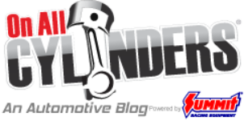Mailbag: Understanding Internal Balance vs. External Balance Chevy Flexplates
Q: The 350 engine in my 1990 Chevy truck needs a flexplate. Some guys tell me it’s internally balanced, while others say it’s externally balanced. I don’t know which flexplate to order. Can you help? A: Prior to 1986, all Chevy small blocks were internally balanced (except the 400). These two-piece rear main seal engines had
Ask Away! with Jeff Smith: Can I Use a Big Block Oil Pump on a Small Block Chevy?
A friend of mine suggested using a big-block oil pump on my small-block Chevy in order to get smoother flow and more volume with a stock volume pump? Will that work? D.B. Jeff Smith: It seems there’s quite a bit of confusion regarding oil pumps and oil pressure so let’s focus on what’s happening. We’ve
Street Ultra 582: Hardcore Horsepower’s 805 HP Pump Gas Big Chevy
[portfolio_slideshow id=57687] Back in 1999, Mike Petralia at Hardcore Horsepower & Dyno Shop in Franklin, TN built a 556-cubic-inch big block Chevy test mule for Hot Rod magazine. That engine made 790 horsepower at 6,700 rpm and 656 ft.-lbs. of torque at 5,700 rpm on pump gas. That was a ton of power back then, and more than
Mailbag: X303 or E303 — Considering Valve Clearance When Selecting a Ford Cam
Q: I have a 1989 5.0L Mustang, and I recently purchased a Ford Performance X303-grind cam for it. I have some questions concerning valve clearance. Can I run stock pistons with this cam, or will it be necessary to alter the piston to achieve the proper piston valve clearance. How much clearance is recommended with this cam?
Infographic: Cylinder Head Torque Sequences for Ford 6 & V6 Engines
We’ve discussed previously what a drag following rules can sometimes be. We don’t always like doing what we’re supposed to. But when it comes to torque sequences and recommended torque specifications, rebellion isn’t half as cool (or financially responsible) as following rules. Torque specifications vary by fastener brand, lubricants used, and other factors. But the
Ask Away! with Jeff Smith: How to Set Preload on Hydraulic Lifters — and Why It’s Important!
I just installed a new cam in my small block Chevy. The engine runs great, but I’ve noticed that at idle and at some cruising speeds the engine makes a noise that sounds more like a mechanical lifter camshaft. I bought a hydraulic flat tappet camshaft but this one sounds more like a solid lifter
Monday Mailbag: The Mystery of the 4,000 RPM Power Drop-Off
Q: I have a 1988 Chevy 350, bored .060-inch over. It has TRW forged flat top pistons, 230-degree duration (at .050-inch lift)/.560-inch lift COMP Cams roller cam run straight up, and iron heads with 64cc chambers, 2.02/1.60-inch valves, and ported intake runners. The intake is an Edelbrock Torker II with a Performer 750 cfm vacuum secondary carburetor.
Ask Away! with Jeff Smith: What You Need to Know About Ethanol, Fuel Blends & Your Fuel Line
I’m hearing all kinds of things about ethanol in fuel that will destroy a normal rubber fuel line. Should I change the fuel line in my car? I’ve heard that ethanol will even eat the steel fuel line. Is that true? What kind of fuel line should I use? B.E. Jeff Smith: Let’s start with
How to Load Trailers Safely and Help Prevent Catastrophe
Very bad things can happen when we load trailers improperly. We were reminded of this fact after seeing video of U-Haul’s trailer-sway demonstration at the Commercial Vehicle Safety Alliance Conference last month: Great demo by @uhaul today @CVSA Conference shows affect of weight distribution on trailer #weightforward #trailer. pic.twitter.com/veefMuWC4v — OPCVC (@OPCVC) September 22, 2016
Race Tire Tutorial: A Guide to Tire Tubes, Tire Screws, and Beadlocks (and What’s Right for You)!
Go to a dragstrip and you’ll see cars with beadlocks, tire screws, and what appears to be nothing holding the tire bead to the wheel rim. Some cars will run tubeless. Others will have tubes. Ponder all of the combinations, and the big picture starts to get a wee bit confusing So what tire setup




Stay Connected